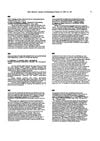 3 citations,
February 2022 in “Frontiers in Genetics”
3 citations,
February 2022 in “Frontiers in Genetics” The LncRNA AC010789.1 slows down hair loss by promoting hair follicle growth and interacting with miR-21 and the Wnt/β-catenin pathway.
 5 citations,
September 2020 in “Molecules”
5 citations,
September 2020 in “Molecules” Extracts from three Polynesian plants were found to promote hair growth by affecting cell growth and gene expression related to hair.
 July 1995 in “Journal of Dermatological Science”
July 1995 in “Journal of Dermatological Science” Cyclosporine starts hair growth faster, while minoxidil makes it last longer.
9 citations,
June 2022 in “Plants” Shallot extract may help with hair growth and treating hair loss.
 1 citations,
October 2018 in “InTech eBooks”
1 citations,
October 2018 in “InTech eBooks” Only minoxidil and finasteride are FDA-approved for hair loss, with other treatments available but less effective or with side effects.
 42 citations,
March 2010 in “Endocrinology”
42 citations,
March 2010 in “Endocrinology” Mice with human gene experienced hair loss when treated with DHT.
 52 citations,
June 1999 in “Endocrinology and Metabolism Clinics of North America”
52 citations,
June 1999 in “Endocrinology and Metabolism Clinics of North America” Antiandrogen treatments combined with oral contraceptives can help manage hair growth and hair loss in women with PCOS.
 2 citations,
January 2023 in “BioMed Research International”
2 citations,
January 2023 in “BioMed Research International” Beetroot extract nanogel may help treat hair loss caused by testosterone.
 November 2018 in “Springer eBooks”
November 2018 in “Springer eBooks” Finasteride and minoxidil are effective, low-risk treatments for male hair loss, and patient education on these therapies is important.
 8 citations,
December 2015 in “PubMed”
8 citations,
December 2015 in “PubMed” Phyllanthus niruri extract may help treat hair loss by promoting hair growth and blocking a hair loss-related enzyme.
 1 citations,
August 2022 in “Molecules”
1 citations,
August 2022 in “Molecules” Prunus mira kernels contain components that can promote hair growth in mice.
 8 citations,
April 2020 in “Journal of Ethnopharmacology”
8 citations,
April 2020 in “Journal of Ethnopharmacology” Herbs might help with hair loss, but more research is needed to confirm their safety and effectiveness.
1 citations,
December 2023 in “Biomolecules” Regulating cell death in hair follicles can help prevent hair loss and promote hair growth.
February 2023 in “PLOS ONE” Caizhixuan hair tonic helps treat hair loss by promoting hair growth and improving hair follicles.
 April 2024 in “Biomedicine & pharmacotherapy”
April 2024 in “Biomedicine & pharmacotherapy” Pilose antler extract helps hair grow in mice with a type of hair loss by speeding up the growth phase.
Natural products may help treat hair loss by promoting hair growth with fewer side effects.
 January 2024 in “International Journal of Molecular Sciences”
January 2024 in “International Journal of Molecular Sciences” Blocking the protein CXCL12 with a specific antibody can increase hair growth in common hair loss conditions.
March 2023 in “International Journal of Molecular Sciences” ADSC-Exos with miR-122-5p can help treat hair loss by promoting hair growth.

Certain drugs can worsen hair loss in people prone to androgenetic alopecia.
 October 2023 in “Annales Academiae Medicae Silesiensis”
October 2023 in “Annales Academiae Medicae Silesiensis” Saw palmetto extracts might help treat male hair loss and need more research.
 June 2023 in “Stem cell reviews and reports”
June 2023 in “Stem cell reviews and reports” Stem cell therapies could be a promising alternative for hair loss treatment, but more research is needed to understand their full potential and safety.
 1 citations,
July 2023 in “International Journal of Biological Macromolecules”
1 citations,
July 2023 in “International Journal of Biological Macromolecules” The study created a new hair loss treatment paste that regrows hair faster and with fewer side effects than minoxidil alone.
September 2023 in “Animals” Genes linked to wool fineness in sheep have been identified.
 23 citations,
January 2020 in “Frontiers in Pharmacology”
23 citations,
January 2020 in “Frontiers in Pharmacology” Dihydrotestosterone affects hair growth by changing the Wnt/β-catenin pathway, with low levels helping and high levels hindering growth.
 4 citations,
January 2015 in “Endocrinology & metabolic syndrome”
4 citations,
January 2015 in “Endocrinology & metabolic syndrome” Testosterone can cause acne and male-pattern baldness, affects hair growth in men and women, and makes male skin more sensitive.
 2 citations,
December 2004 in “Medicine”
2 citations,
December 2004 in “Medicine” Different hair and scalp disorders cause hair loss or excess hair growth, with various treatments available depending on the specific condition.
 10 citations,
June 2019 in “International Journal of Cosmetic Science”
10 citations,
June 2019 in “International Journal of Cosmetic Science” Some plant-based chemicals may help with hair growth, but more research is needed to confirm their effectiveness.
 1 citations,
January 2015 in “Springer eBooks”
1 citations,
January 2015 in “Springer eBooks” AGA is a common hair loss disorder, and early diagnosis and treatment with minoxidil or finasteride can help reduce emotional distress.
 1 citations,
January 2009 in “CRC Press eBooks”
1 citations,
January 2009 in “CRC Press eBooks” Finasteride increases hair count and improves hair growth with low risk of side effects.
 15 citations,
October 2003 in “Dermatologic Surgery”
15 citations,
October 2003 in “Dermatologic Surgery” Minoxidil, finasteride, and hair transplantation combined give best results for hair loss.























